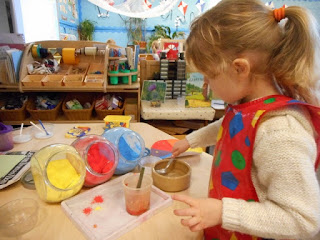The Influence of Froebel
Tuesday, September 22, 2015 |
| Frederick Froebel (1782-1852) |
Frederick Froebel is one of the most significant influences on early years education today and yet most of us know very little about him.
In September 2012 I had the opportunity to enrol on the Froebel in Early Childhood Education course at Edinburgh University. I began the course not knowing much about Friedrich Froebel but hoping to explore the possibility of finding coherence in my own practice and of developing an underlying philosophy which could inform my emergent pedagogy.
Froebel truly was a pioneer. He was one of the first educators to consider that the education of children under the age of 7 was worthwhile. He established the Kindergarten (Child Garden), where children could learn through play. His approach to play constituted a significant shift in the way that children’s play and its role in their education was viewed. He wrote that "play at this time is not trivial, it is highly serious and of deep significance" (Fröbel, 1826). Froebel maintained that the teachers of young children should be highly educated and he believed that women could and should take on this teaching role.
Although to our contemporary eyes, the play in Froebel’s kindergarten would seem highly formal, his work has had a significant influence on early years practice. He developed materials that included wooden blocks, wooden tiles, pin boards, sewing, weaving, paper folding, stick laying, construction with sticks and peas, woodwork, drawing, painting and clay, encouraged activity and movement through songs and emphasised the importance of the study of nature and the connection with the outside world. All of these things can still be seen in various forms in most nurseries today.
So what does the work of Froebel, born more than 230 years ago, mean for contemporary practice?
The work of practitioners in the Froebel tradition such as Susan Isaacs, Margaret McMillan and Tina Bruce has continued Froebel’s approach and philosophy through to the present day.
‘Froebel’ is not a ‘method’ in the way perhaps that the work of Maria Montessori or Rudolf Steiner has become, but develops from reflective practice with the child as the focus, embedded in family and community. It is a set of guiding principles which are interpreted in many ways depending on the context in which practitioners are working. It looks different in different settings.
Froebel’s principles, pedagogy and practice which the Froebel Trust sets out on their website resonate strongly with my own values, experiences, and way of working and have become for me the underlying philosophy which informs my day to day work with the children in my setting.
Principles
- Recognition of the uniqueness of each child's capacity and potential
- An holistic view of each child's development
- Recognition of the importance of play as a central integrating element in a child's development and learning
- An ecological view of humankind in the natural world
- Recognition of the integrity of childhood in its own right
- Recognition of the child as part of a family and a community
- Their right to protection from harm or abuse and the promotion of their overall well-being
Pedagogy
- Knowledgeable and appropriately qualified early childhood professionals
- Skilled and informed observation of children, to support effective development, learning and teaching
- Awareness that education relates to all capabilities of each child: imaginative, creative, symbolic, linguistic, mathematical, musical, aesthetic, scientific, physical, social, moral, cultural and spiritual
- Parents/carers and educators working in harmony and partnership
- First-hand experience, play, talk and reflection
- Activities and experiences that have sense, purpose and meaning to the child, and involve joy, wonder, concentration, unity and satisfaction
- An holistic approach to learning which recognises children as active, feeling and thinking human beings, seeing patterns and making connections
- Encouragement rather than punishment
- Individual and collaborative activity and play
- An approach to learning which develops children's autonomy and self confidence
- Physically safe but intellectually challenging, promoting curiosity, enquiry, sensory stimulation and aesthetic awareness
- Demonstrates the unity of indoors and outdoors, of the cultural and the natural
- Allows free access to a rich range of materials that promote open-ended opportunities for play, representation and creativity
- Entails the setting being an integral part of the community it serves, working in close partnership with parents and other skilled adults
- Educative rather than merely amusing or occupying
- Promotes interdependence as well as independence, community as well as individuality and responsibility as well as freedom.
Fröbel, F., 1826. Die Menschenerziehung (On the Education of Man). Keilhau, Leipzig: Weinbrack.














0 comments